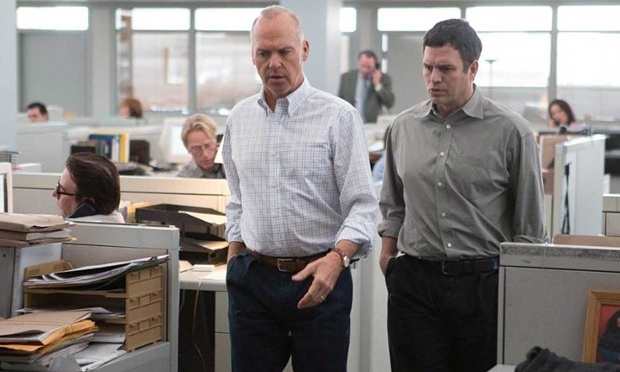Spotlight Review – Catholic Church Child Abuse Film Decently Tells an Awful Story
By Peter Bradshaw
“If it takes a village to raise a child, it takes a village to abuse one,” is how one character here summarises the issues. This high-minded, well-intentioned movie, co-written and directed by Tom McCarthy, is about the Boston Globe’s investigative reporting team Spotlight, and its Pulitzer-winning campaign in 2001 to uncover widespread, systemic child abuse by Catholic priests in Massachusetts. The film shows that in the close-knit, clubbably loyal and very Catholic city of Boston, no one had any great interest in breaking the queasy, shame-ridden silence that made the church’s culture of abuse possible, and even tentatively suggests that the Globe itself was one of the Boston institutions affected. The paper had evidence of abuse 10 years before the campaign began, but somehow contrived to downplay and bury the story, and it took a new editor, both non-Boston and Jewish, to get things started. Spotlight has a few inevitable journo cliches: male reporters are dishevelled mavericks who don’t need to keep the same hours as everyone else, doing a fair bit of shouting and desk-thumping. There is much cheeky machismo on the subjects of poker and sports, and they somehow never need to do the boring grind of sitting down and writing stuff on computers. But this is a movie that is honourably concerned to avoid sensationalism and to avoid the bad taste involved in implying that journalists, and not the child abuse survivors, are the really important people here. So there is something cautious, even occasionally plodding, in its dramatic pace. We keep hearing about how the church is going to come after reporters who dare to challenge its authority – but this never really happens, and there is none of the paranoia of a picture like Alan J Pakula’s All the President’s Men (1976) or Michael Mann’s The Insider (1999). Yet McCarthy keeps the narrative motor running, and there are some very good scenes, chiefly the extraordinary moment when Rachel McAdams’s reporter doorsteps a smilingly hospitable retired priest and asks him, flat-out, if he has ever molested a child. The resulting scene had me on the edge of my seat. Mark Ruffalo is chief reporter Michael Rezendes; McAdams is his colleague Sacha Pfeiffer. Michael Keaton plays the careworn and distracted Spotlight editor Robby Robinson – an interesting comparison with his performance as the journalist nearing breakdown in Ron Howard’s The Paper (1994) – and John Slattery plays the section chief Ben Bradlee Jr, son of the great man himself, although Watergate is not mentioned. Liev Schreiber plays the new broom editor Marty Baron who quietly insists on the investigation from day one. Soon, the team discover that the smoothie lawyer Eric MacLeish (Billy Crudup) who has been handling victim cases until now has effectively been part of the cover-up, managing a system whereby cases are settled privately and complainants silently bought off with cash payments, of which MacLeigh takes his cut. Rezendes approaches another lawyer, testy advocate Mitch Garabedian (Stanley Tucci), who has been doggedly working for a serious action to be contested in open court. There are smoking-gun documents proving that church high-ups knew all about the problem and covered it up, Mitch says, but these documents are legally sealed and the Spotlight team must find a way of putting them on the record. Their problems are made even worse when 9/11 comes along, putting every other story in the shade and allowing the Catholic cardinal to make morale-boosting public statements calling for calm and courage. What is interesting about this movie is that it reminds you that the “bad apple” theory of child abuse by priests was widely accepted until relatively recently. The team are stunned at the realisation that what they are working on is not like, say, a corruption case where there are more public officials on the take than they at first thought. It is a mass psychological dysfunction hidden in plain sight, which has stretched back decades or even centuries and will, unchecked, do precisely the same in the future. What McCarthy is saying in Spotlight is that threats never needed to be made. A word here, a drink there, a frown and a look on the golf course or at the charity ball, this was all that was needed to enforce a silence surrounding a transgression that most of the community could hardly believe existed anyway. It’s certainly a relevant issue in our unhappy, post-Yewtree times. Spotlight never hits the heights of passion, but capably and decently tells an important story.
|
.
Any original material on these pages is copyright © BishopAccountability.org 2004. Reproduce freely with attribution.
